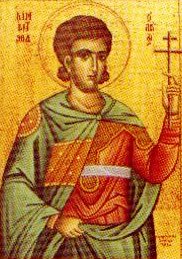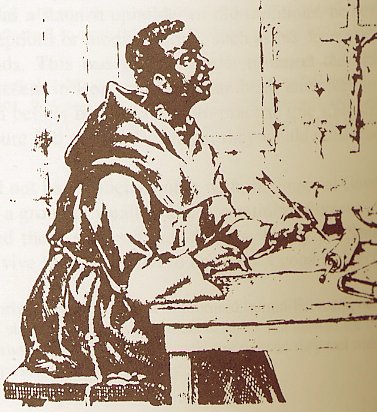Black Afrikans of Rome have contributed greatly to the growth of Christianity and the development of the Roman Catholic doctrine. Three of the greatest scholars and founding theologians of Christianity were Black Romans who included Tertullian, Cyperian, and St. Augustine, but the greatest contributions were made by these three Black popes; Pope Victor I, Pope Miltiades, and Pope Gelasius I.
 Pope Victor I, the 14th pope, served from 189 A.D. - 199 A.D. In 189 A.D., there was major controversy regarding the date of Easter which was celebrated in Asia on the 14th day after the full moon. This fell on any day of the week and therefore meant that some Christians would have been celebrating Lent while others would have been celebrating the Resurrection, so Pope Victor I in a council held in Rome in 196, decreed that the Feast of Easter would be celebrated only on the Sunday after the 14thday of the moon of March, and any Asian Christians who defied this declaration would be excommunicated. From that point onwards, Easter was celebrated only on the Sunday.
Pope Victor I, the 14th pope, served from 189 A.D. - 199 A.D. In 189 A.D., there was major controversy regarding the date of Easter which was celebrated in Asia on the 14th day after the full moon. This fell on any day of the week and therefore meant that some Christians would have been celebrating Lent while others would have been celebrating the Resurrection, so Pope Victor I in a council held in Rome in 196, decreed that the Feast of Easter would be celebrated only on the Sunday after the 14thday of the moon of March, and any Asian Christians who defied this declaration would be excommunicated. From that point onwards, Easter was celebrated only on the Sunday.
Also, under the influence of the Black theologian Tertullian, Pope Victor I, who is now celebrated as a saint with his feast day of July 28th, declared that Greek would be replaced by Latin as the official language of the Church of Rome. Pope Victor was therefore the first to celebrate Mass in Rome using Latin, the common language of the people.
Pope Victor I also condemned and excommunicated Theodore of Byzantium for heresy after he enticed followers in Rome to deny the divinity of Jesus Christ, by preaching that He was just an ordinary man filled with supernatural powers through Baptism.
When the Black Romans with Victor and Tertullian were in control of the religious world, they also gained political and military power in 193 A.D through Septimius Severus, a Black Roman who became the Roman Emperor. He did not forget his roots however, and made hefty donations to the city's poor while also employing them in massive building projects. Septimius Severus was succeeded as emperor by his son Caracalla from 211 A.D. until 217 A.D.
 Pope St. Miltiades or Mechiades, the second Black pope, served from 311 A.D until 314 A.D as the 32nd pope. Militiades decreed that none of the faithful should fast on Sunday or on the fifth (5th) day of the week because this was the custom of the pagans. After taking office, Miltiades persecuted the Christians until he got an edict of toleration from Emperor Galerius to end such persecutions and allow the Christians to emerge from their underground caves. Pope Miltiades then convinced Emperor Maxentius to return all church buildings and possessions confiscated during the persecutions.
Pope St. Miltiades or Mechiades, the second Black pope, served from 311 A.D until 314 A.D as the 32nd pope. Militiades decreed that none of the faithful should fast on Sunday or on the fifth (5th) day of the week because this was the custom of the pagans. After taking office, Miltiades persecuted the Christians until he got an edict of toleration from Emperor Galerius to end such persecutions and allow the Christians to emerge from their underground caves. Pope Miltiades then convinced Emperor Maxentius to return all church buildings and possessions confiscated during the persecutions.
It was also during the reign of Pope Miltiades that Emperor Constantine converted to Christianity after receiving the vision of a cross. Constantine's army marched into Rome in 312 A.D and overthrew the oppressor Maxentius, later making Christianity the authorized religion of the Roman Empire. Pope Miltiades was made a saint, and his feast was celebrated on December 10th. The Black Roman theologian St. Augustine referred to Pope Miltiades as "an excellent pontiff, a true son of peace, and father of Christians".
 Pope Gelasius I, the 49th pope, was the third Black pope who came to office in 492 A.D., (1,000 years before America was supposedly discovered). Born in Rome of Afrikan parentage, he was a member of the Roman clergy from a youth. Gelasius I devoted himself to uplifting the poor and the weak, and instructed his bishops to donate a quarter of their income to charity, emphasising that "nothing is more becoming to the priestly office than the protection of the poor and the weak". His contemporaries described him as "famous all over the world for his learning and holiness".
Pope Gelasius I, the 49th pope, was the third Black pope who came to office in 492 A.D., (1,000 years before America was supposedly discovered). Born in Rome of Afrikan parentage, he was a member of the Roman clergy from a youth. Gelasius I devoted himself to uplifting the poor and the weak, and instructed his bishops to donate a quarter of their income to charity, emphasising that "nothing is more becoming to the priestly office than the protection of the poor and the weak". His contemporaries described him as "famous all over the world for his learning and holiness".
Pope Gelasius I was also credited with ending the pagan ritual of Lupercalia, a fertility rite celebration where young men would dress in skins and strike any woman they met with a whip, believing that it conferred fertility and chased away bad luck. He sternly asked why the gods they worshipped did not calm the seas so the ships transporting the grain could reach Rome in time for the winter. He replaced Lupercalia with the "feast of the purification of the blessed virgin" presently known as "Candlemas" and declared a day in honour of St. Valentine.
Pope Gelasius also wrote to Femina, a wealthy woman of rank, asking her to have the lands of St. Peter which were taken by the barbarians and the Romans returned to the church, since the lands were needed for the poor who were assembling in Rome. Gelasius I became very famous through his firm letter to Emperor Anastasius regarding the need for independence of church and state. He told the emperor that the world is governed by two great powers; that of the popes, and that of kings; but the authority of the popes is so much greater because on judgment day, popes will have to render an account to God for the soul of the kings. Gelasius I was made a saint and his feast day is held on November 21st.
So, contrary to the belief held by many who refer to Christianity as a white man's religion, the facts show that Christianity was founded by the genius of three Black theologians and further developed and propelled by devoted contributions made by the three Black Roman popes.

© John Moore - Barbados, W.I. (March 2000) ©. All rights reserved.